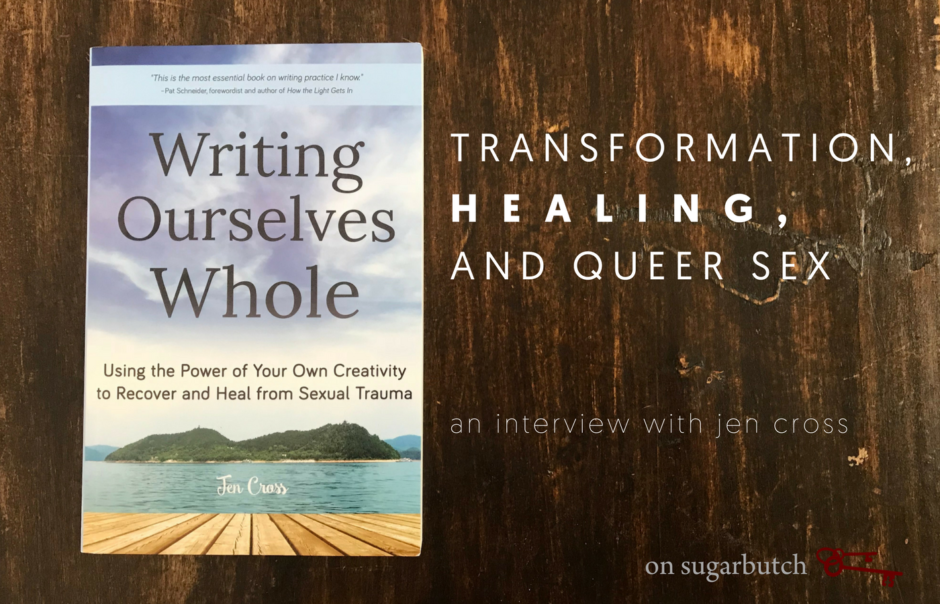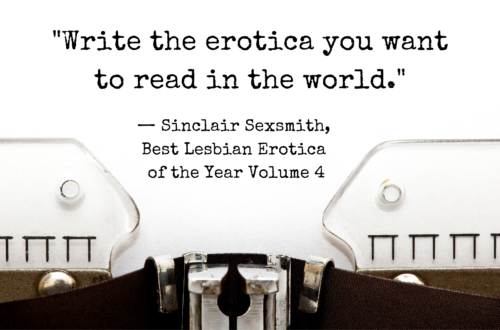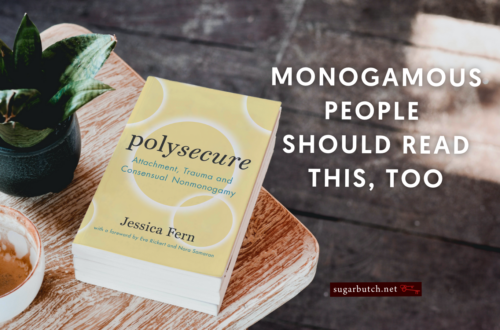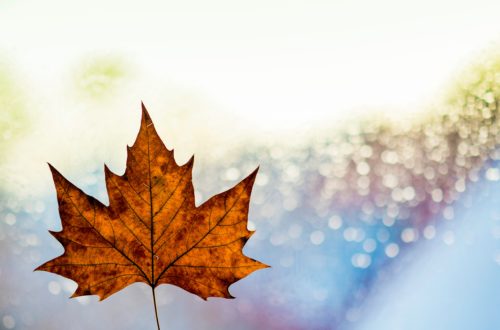I am thrilled to share a beautiful interview with Jen Cross, author of Writing Ourselves Whole: Using the Power of Your Own Creativity to Recover and Heal from Sexual Trauma.
The first few times I cracked open the book, a writing exercise chose me, and I sat down to keep my pen moving for ten minutes, I ended up in tears. Since the national conversation about sexual assault has been so visible these past few months, I have — like many of us — been thinking more and more about assault and #metoo. I’ve seen the conversations about consent violations and consent accidents grow significantly in the kink communities in recent years, too, and I’m glad we’re both giving it more weight and talking about how it is that we as a community want to work with it, since the legal system isn’t actually helpful in resolving these complex occurrences.
(Jen has some excellent writings over on the Writing Ourselves Whole blog. Highly recommend.)
The beautiful personal memoir writing, the guidance through one’s own inner world through writing prompts and inspired quotes and sharing, the reclamation of sexuality and sexual flow and eros and erotic joy — this book moves me, shakes me up, soothes me. I haven’t worked through all of it. It’s intense. But I’ve picked it up when I need a kick in my writing voice, when I need to stop blah blah blah-ing in my journal entries and actually get down deep into something. Sometimes it has been a serious kick to the gut.
Be careful what you wish for.
Interview with Jen Cross
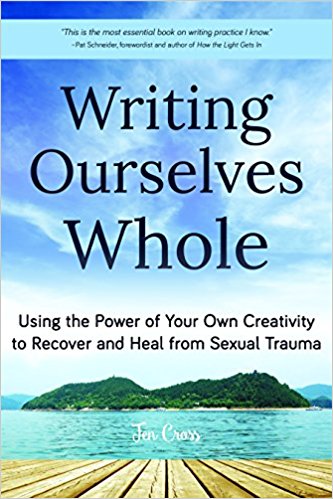 How did this project come about?
How did this project come about?
This book grew out of my own relationship (for the last 20-something years!) to freewriting as a healing practice and the work I did for my MA in Transformative Language Arts (Goddard College) — at that time, I was focused on erotic writing as a healing and transformative practice for survivors of sexual violence. It was through that program that I led my first writing groups, in fact. Over the years, I’ve expanded my work to writing about sexual trauma more broadly, as well. What I’ve found is that writing — either alone or in a community of generous and supportive peers — can be a way to find language for experiences of violence or trauma (or its aftermath) that were meant never to be expressed, a way to break down the isolation that is an inherent part of intimate trauma, and a way to reconnect with our creative intuition: that quiet, persistent voice within that we often had to ignore during the time that we were being abused. With this book, I wanted to share my experiences as a writer, survivor, and workshop facilitator, and offer support to trauma survivors (and others) who are seeking to find their way into words, as well as to anyone who would like to gather together a peer survivors writing group in their own community!
The work in this book is at the intersection of three topics/communities – survivors of sexual assault, erotic and sexual writing, and queer folks. How are these interwoven, and how do you see the potency of the intersection?
The spark for this work came out of my own relationship with my sexuality — at the same time that I was getting away from my stepfather and his abuse, I also came out as queer, so these two parts of my identity are intertwined. I found myself part of a couple of communities — an incest survivor community (which often seemed not to want to think or talk about sex at all, since that was the site of our wounding) and a sex-positive queer community (which, given our struggle as a community to get out from under the shame of homophobia and a sex-negative upbringing, seemed only to want to talk about how excellent sex was). What was true for me (and is still true), though, was that sex was complicated and messy, both a place of longing and desire, and a place of struggle and pain. What I wanted was a place to be able to connect with the fullness and complexity of my adult, lives, consensual sexuality, given my history and my identity as a queer woman.
So, when I got started in leading writing groups, I facilitated an erotic writing group for queer women survivors of sexual trauma. In this group, we mostly didn’t write our trauma story, but instead wrote fiction and fantasy; we wrote about the gorgeous complications of our lived sexuality, and gently wrote ourself into new possibility, into our bodies, into new desire, into sex.
I think a lot about Audre Lorde’s definition of the erotic, from her essay “Uses of the Erotic: The Erotic as Power” (in Sister/Outsider) as a knowledge and quality of embodiment that “flows through and colors [our lives] with a kind of energy that heightens and sensitizes and strengthens all [our] experience.” The erotic is connected to our sexuality, but, given this definition, I think about the erotic more broadly — as having to do with desire in all its forms. We have sexual desire, but we also have creative desire, we have desire for fulfilling work, we have desire for connection, social change, and so on — those of us who have experienced sexual violence (particularly as children or young people, but this can be true for those abused as adults, as well) are often trained to expend a great deal of energy paying attention to someone else’s desire; most of us who are socialized as women are, too. We don’t know what we want — in fact, we aren’t supposed to want anything. We are supposed to want to be wanted, to be the object of someone else’s desire, and that’s all. We are supposed to tend to the desire of the other. Folks on college campuses want their students to communicate clearly and directly about what they want, to say yes and no definitively; but what if we don’t even know what we want? How can we make such an assertion?
In my erotic writing groups, I wanted to push into that question: What if it were ok to want? What if I could want without anyone having any expectation of me? What if I could want without anyone taking advantage of it, or using that desire against me?
What do you most want people to take away from your work?
What I want, more than anything, is for folks to write! So many of us want to write, or to express ourselves creatively in another way, but we have been trained away from our creative expression, or we have been called stupid or dumb, or someone important to us told us we were bad writers because we misplaced a comma or didn’t capitalize a sentence correctly — or, we have feared putting into words how we were harmed or violated. I am always moved when any survivor of trauma, and particularly sexual trauma, manages to write (whether or not they write about the violence done to them), because they are claiming a voice that was shut down, claiming a creativity that was shamed or silence, claiming words that may have been used against them. What I hope is that, as folks are reading Writing Ourselves Whole, they allow themselves to put it down and write whenever they are called to write — in response to a prompt, or one of the chapters; maybe they wish I had said or worded something differently — I encourage folks to write down how they would have said it!
Anything else you’d like to add?
We are an enormous community, we survivors of sexual violence — when we come together, when we tap into our creative genius voices and raise our voices, we are a force to be reckoned with. Every time a survivor tells their story —as memoir, in fiction or poetry, in paint or dance or song or craft — we claim some small bit of what our perpetrators tried to steal from us; we reveal that it was ours, was in us, all along.
Go visit some more stops on the 2018 Writing Ourselves Whole blog tour!
3/5 – Interview with Kori Doty of Sex, Drugs, How We Roll podcast: Sex, Drugs and How We Roll – w/ Jen Cross, Writing Ourselves Whole
3/8 – Why I’m starting a writing practice to heal from grief and trauma, The Art of Healing Trauma blog, by Heidi Hanson
3/16 – sex, love, and all the feels:
3/20 – On Lauren Sapala’s blog (writing coaching for introverts and others!):
http://laurensapala.com/willing-leave-unfinished/
3/30 (or thereabouts) Sugarbutch
4/7 – laurietobyedison.com/body-impolitic-blog/
TBD – Kitty Stryker and Consent Culture
TBD – GoodVibes blog
TBD – Talking Writing Magazine
Pick up the book at your local independent bookstore, or if you must, on Amazon.

